-
 Bitcoin
Bitcoin $85,053.4987
0.47% -
 Ethereum
Ethereum $1,604.0688
1.50% -
 Tether USDt
Tether USDt $0.9997
-0.01% -
 XRP
XRP $2.0888
1.22% -
 BNB
BNB $593.1504
0.71% -
 Solana
Solana $138.4195
3.26% -
 USDC
USDC $0.9999
-0.01% -
 Dogecoin
Dogecoin $0.1597
3.11% -
 TRON
TRON $0.2415
-1.60% -
 Cardano
Cardano $0.6329
3.08% -
 UNUS SED LEO
UNUS SED LEO $9.2888
0.62% -
 Chainlink
Chainlink $12.7878
1.44% -
 Avalanche
Avalanche $19.2917
1.31% -
 Stellar
Stellar $0.2447
1.18% -
 Toncoin
Toncoin $3.0011
0.71% -
 Shiba Inu
Shiba Inu $0.0...01226
3.89% -
 Hedera
Hedera $0.1676
2.05% -
 Sui
Sui $2.1459
1.63% -
 Bitcoin Cash
Bitcoin Cash $337.7604
2.53% -
 Hyperliquid
Hyperliquid $17.6730
4.32% -
 Polkadot
Polkadot $3.7299
1.72% -
 Litecoin
Litecoin $76.5325
1.77% -
 Dai
Dai $0.9999
0.00% -
 Bitget Token
Bitget Token $4.4634
2.38% -
 Ethena USDe
Ethena USDe $0.9991
0.00% -
 Pi
Pi $0.6486
5.66% -
 Monero
Monero $212.3459
-1.60% -
 Uniswap
Uniswap $5.2591
1.62% -
 Pepe
Pepe $0.0...07316
3.79% -
 OKB
OKB $50.8354
2.04%
What is the difference between an Ethereum ETF and Ethereum itself?
Ethereum ETFs offer regulated, accessible exposure to Ethereum's price, mitigating some risks of direct ownership, but incur management fees unlike direct holdings which have transaction fees.
Mar 16, 2025 at 02:40 pm
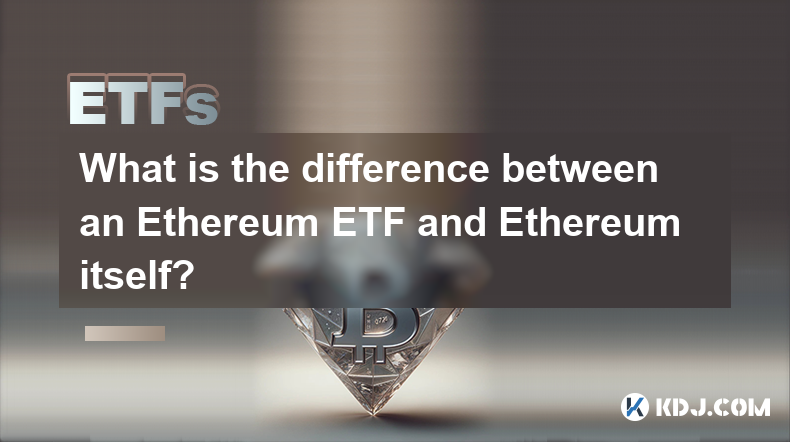
Key Points:
- Underlying Asset: An Ethereum ETF tracks the price of Ethereum, while Ethereum itself is the underlying cryptocurrency.
- Regulation and Accessibility: Ethereum ETFs are regulated securities traded on traditional exchanges, offering greater regulatory oversight and accessibility compared to directly purchasing Ethereum.
- Investment Method: Investing in an Ethereum ETF involves buying shares of the fund, while investing in Ethereum requires purchasing and holding the cryptocurrency directly.
- Fees and Expenses: Ethereum ETFs incur management fees and expense ratios, unlike directly holding Ethereum, which only incurs transaction fees.
- Exposure and Risk: An Ethereum ETF provides exposure to Ethereum's price movements but mitigates some risks associated with direct cryptocurrency ownership, such as security breaches.
What is the difference between an Ethereum ETF and Ethereum itself?
The core difference lies in how you gain exposure to Ethereum's price movements. Ethereum is a decentralized digital currency, a blockchain-based technology used for smart contracts and decentralized applications (dApps). Investing directly means owning and holding Ethereum tokens. This involves using cryptocurrency exchanges, managing your own private keys (essential for security), and navigating the often volatile cryptocurrency market.
An Ethereum ETF, on the other hand, is a tradable security that tracks the price of Ethereum. It's a fund that invests in Ethereum, allowing investors to gain exposure to its price fluctuations without directly owning the cryptocurrency. This offers a degree of indirect exposure within a more regulated and familiar investment framework.
Regulation and Accessibility:
Direct Ethereum ownership exists outside the traditional regulatory frameworks governing securities. This lack of regulation can present certain risks, particularly regarding investor protection. In contrast, Ethereum ETFs are subject to regulatory oversight by bodies like the SEC (in the US). This added layer of regulation provides a degree of investor protection not present in direct cryptocurrency ownership. Furthermore, ETFs are traded on established exchanges, making them accessible to a wider range of investors compared to the complexities of accessing and securing cryptocurrencies.
Investment Method and Associated Costs:
Buying Ethereum involves setting up accounts on cryptocurrency exchanges, transferring funds, and purchasing Ethereum tokens. This process often involves paying transaction fees, commonly known as "gas fees" on the Ethereum network. Holding Ethereum requires securing your private keys, which are crucial for accessing and controlling your funds. Losing these keys means losing access to your Ethereum.
Investing in an Ethereum ETF is much simpler. You buy and sell shares of the ETF through a brokerage account, just like any other stock. The complexities of managing private keys and navigating cryptocurrency exchanges are eliminated. However, Ethereum ETFs incur management fees and expense ratios charged by the fund manager. These fees are not present when holding Ethereum directly, apart from the transaction fees mentioned earlier.
Security and Risk Management:
Directly holding Ethereum exposes investors to the risks inherent in cryptocurrency ownership. These risks include the potential for hacking, loss of private keys, and the volatility of the cryptocurrency market itself.
Ethereum ETFs offer a layer of mitigation against some of these risks. While still subject to market volatility, the underlying assets are held and managed by the ETF provider, reducing the risk of personal key loss. The regulatory oversight also adds a layer of protection not afforded to direct cryptocurrency holders. However, the risk of market fluctuations still applies. An ETF's price will still move in tandem with the price of Ethereum.
Liquidity and Trading:
Ethereum, while a widely used cryptocurrency, can experience periods of low liquidity, particularly on smaller exchanges. This can impact your ability to buy or sell quickly at your desired price. Ethereum ETFs, however, trade on established exchanges with significantly higher liquidity. This generally means easier and faster execution of trades at more competitive prices.
Tax Implications:
Tax implications differ significantly between direct Ethereum ownership and investing in an Ethereum ETF. The tax treatment of cryptocurrencies varies widely depending on jurisdiction and the nature of the transaction (trading, staking, etc.). Tax implications for ETFs are generally more straightforward and align with the tax treatment of other securities. It's crucial to consult a tax professional for personalized advice in both cases.
Common Questions and Answers:
Q: Are Ethereum ETFs safer than holding Ethereum directly?
A: Ethereum ETFs offer some additional safety nets due to regulatory oversight and professional management. However, they still carry market risk tied to Ethereum's price volatility. Direct ownership exposes you to additional risks like losing your private keys.
Q: Which option offers better returns?
A: There's no guarantee of better returns with either method. Both are subject to the price fluctuations of Ethereum. However, ETF fees could slightly reduce the potential returns compared to direct ownership.
Q: What are the fees associated with each option?
A: Direct Ethereum ownership involves transaction fees (gas fees) on the Ethereum network. Ethereum ETFs have management fees and expense ratios charged by the fund manager.
Q: Are Ethereum ETFs suitable for all investors?
A: No. Ethereum ETFs are generally more suitable for investors comfortable with some level of market risk but seeking a more regulated and accessible investment vehicle. Direct ownership might appeal to investors with a higher risk tolerance and technical expertise in managing cryptocurrencies.
Disclaimer:info@kdj.com
The information provided is not trading advice. kdj.com does not assume any responsibility for any investments made based on the information provided in this article. Cryptocurrencies are highly volatile and it is highly recommended that you invest with caution after thorough research!
If you believe that the content used on this website infringes your copyright, please contact us immediately (info@kdj.com) and we will delete it promptly.
- Ethena Labs Unveils Converge, a New Layer-1 Blockchain Targeting Tokenized Real-World Assets
- 2025-04-19 12:20:14
- FBI Releases Five Warnings to Help Protect Investors in the Cryptocurrency Space
- 2025-04-19 12:20:14
- Today, the Official Trump ($TRUMP) meme coin tokens have been unlocked, sparking panic among investors.
- 2025-04-19 12:15:14
- Dogecoin (DOGE) Price Prediction: Will the Original Memecoin Reach $1 by Late Summer 2025?
- 2025-04-19 12:15:14
- Resilience is a Distinct Attribute of Solana
- 2025-04-19 12:10:13
- Astar Network Adjusts Its Token Issuance Model to Stabilize APY and Reduce Inflation
- 2025-04-19 12:10:13
Related knowledge
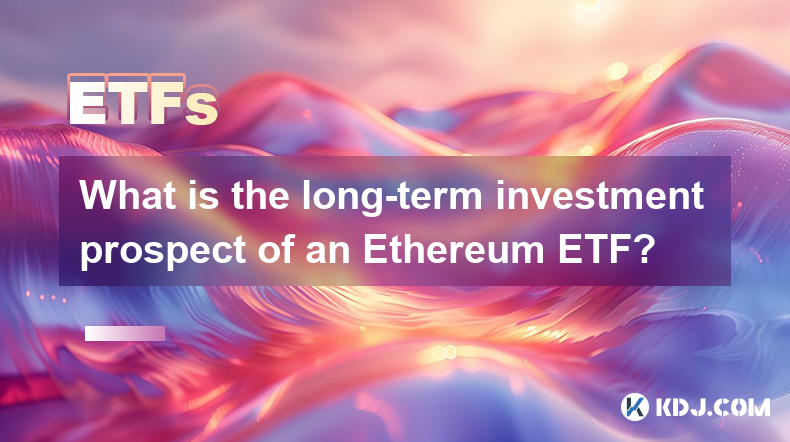
What is the long-term investment prospect of an Ethereum ETF?
Mar 18,2025 at 03:01pm
Key Points:Uncertainty surrounds the long-term prospects of an Ethereum ETF due to regulatory hurdles and market volatility.Approval hinges on regulatory clarity regarding cryptocurrencies, especially concerning investor protection and market manipulation.Successful ETF launches could boost Ethereum's price and adoption, but failure could negatively imp...
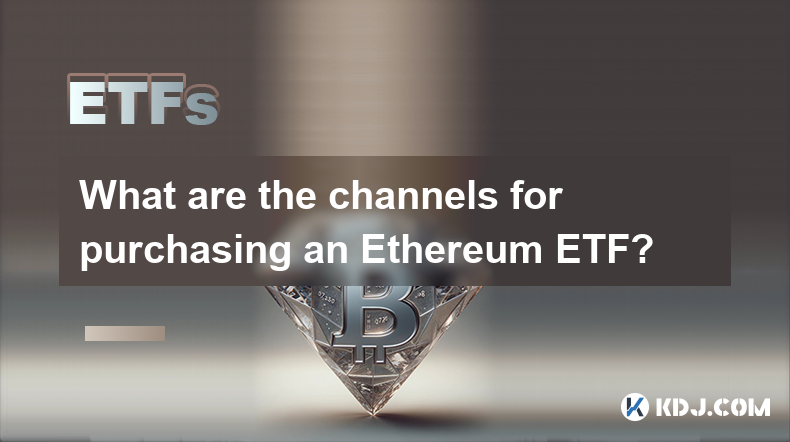
What are the channels for purchasing an Ethereum ETF?
Mar 18,2025 at 01:49am
Key Points:Currently, there are no Ethereum ETFs available for direct purchase by the general public in most major markets.Access to Ethereum exposure through ETFs is limited, mainly through futures-based ETFs.Purchasing Ethereum directly or through other investment vehicles remains a viable alternative.Regulatory hurdles and market complexities signifi...
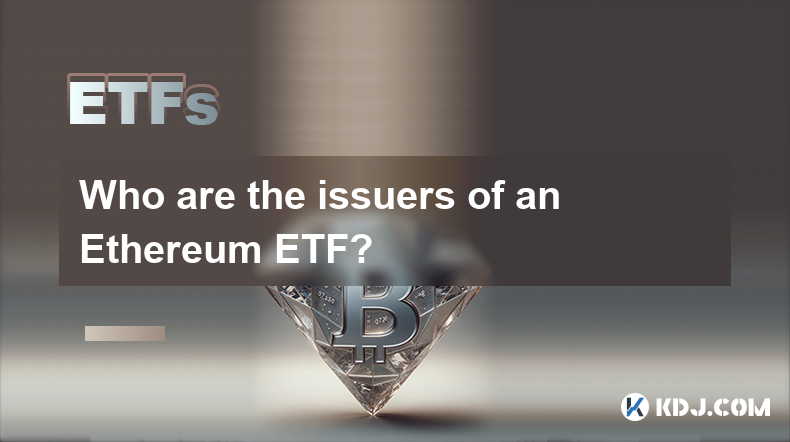
Who are the issuers of an Ethereum ETF?
Mar 19,2025 at 08:07pm
Key Points:There are no currently approved Ethereum ETFs in the US, meaning no single issuer can be definitively named. However, several firms have filed applications.The issuers of potential Ethereum ETFs will be large, established financial institutions, typically asset management companies.The specific requirements for ETF issuers are stringent and o...
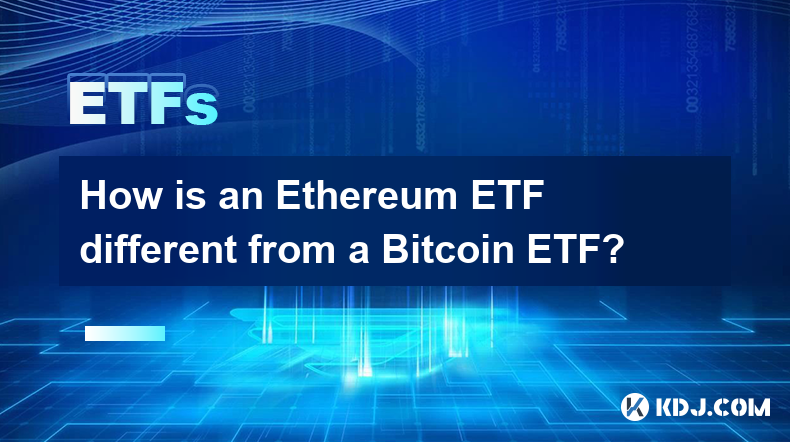
How is an Ethereum ETF different from a Bitcoin ETF?
Mar 17,2025 at 10:55am
Key Points:Underlying Asset: The core difference lies in the underlying asset: an Ethereum ETF tracks the price of Ether (ETH), while a Bitcoin ETF tracks the price of Bitcoin (BTC).Technology and Use Cases: Ethereum's blockchain supports smart contracts and decentralized applications (dApps), creating a distinct technological and investment narrative c...
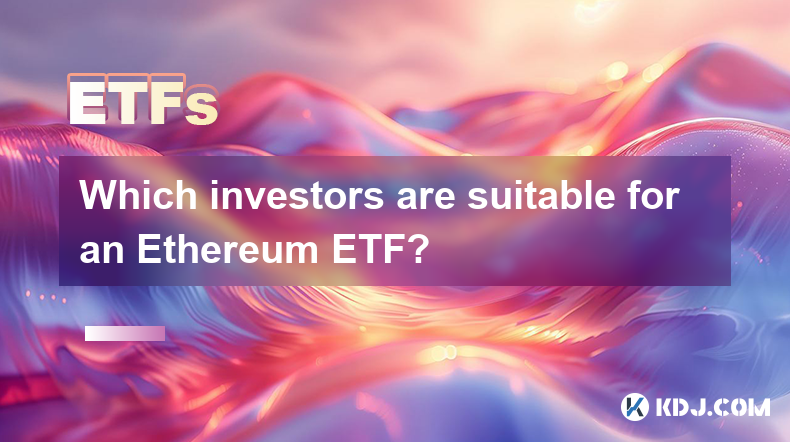
Which investors are suitable for an Ethereum ETF?
Mar 16,2025 at 05:50pm
Key Points:Risk Tolerance: Ethereum ETF investment requires a high risk tolerance due to the volatility of the cryptocurrency market.Investment Goals: Investors seeking long-term growth potential and exposure to the Ethereum ecosystem are suitable candidates.Investment Horizon: A longer-term investment horizon is crucial to weather market fluctuations.U...
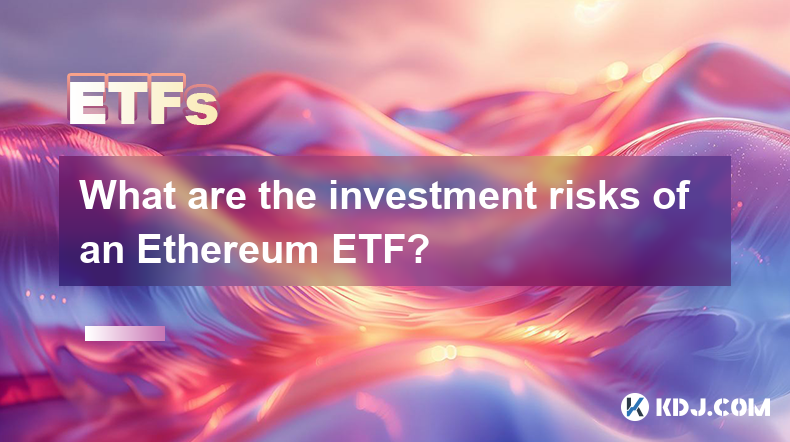
What are the investment risks of an Ethereum ETF?
Mar 18,2025 at 02:12am
Key Points:Price Volatility: Ethereum's price is highly volatile, impacting ETF share prices.Regulatory Uncertainty: Changes in regulatory landscapes can significantly affect ETF trading and performance.Market Manipulation: The potential for market manipulation, particularly in smaller ETFs, exists.Underlying Asset Risk: Risks associated with the Ethere...

What is the long-term investment prospect of an Ethereum ETF?
Mar 18,2025 at 03:01pm
Key Points:Uncertainty surrounds the long-term prospects of an Ethereum ETF due to regulatory hurdles and market volatility.Approval hinges on regulatory clarity regarding cryptocurrencies, especially concerning investor protection and market manipulation.Successful ETF launches could boost Ethereum's price and adoption, but failure could negatively imp...

What are the channels for purchasing an Ethereum ETF?
Mar 18,2025 at 01:49am
Key Points:Currently, there are no Ethereum ETFs available for direct purchase by the general public in most major markets.Access to Ethereum exposure through ETFs is limited, mainly through futures-based ETFs.Purchasing Ethereum directly or through other investment vehicles remains a viable alternative.Regulatory hurdles and market complexities signifi...

Who are the issuers of an Ethereum ETF?
Mar 19,2025 at 08:07pm
Key Points:There are no currently approved Ethereum ETFs in the US, meaning no single issuer can be definitively named. However, several firms have filed applications.The issuers of potential Ethereum ETFs will be large, established financial institutions, typically asset management companies.The specific requirements for ETF issuers are stringent and o...

How is an Ethereum ETF different from a Bitcoin ETF?
Mar 17,2025 at 10:55am
Key Points:Underlying Asset: The core difference lies in the underlying asset: an Ethereum ETF tracks the price of Ether (ETH), while a Bitcoin ETF tracks the price of Bitcoin (BTC).Technology and Use Cases: Ethereum's blockchain supports smart contracts and decentralized applications (dApps), creating a distinct technological and investment narrative c...

Which investors are suitable for an Ethereum ETF?
Mar 16,2025 at 05:50pm
Key Points:Risk Tolerance: Ethereum ETF investment requires a high risk tolerance due to the volatility of the cryptocurrency market.Investment Goals: Investors seeking long-term growth potential and exposure to the Ethereum ecosystem are suitable candidates.Investment Horizon: A longer-term investment horizon is crucial to weather market fluctuations.U...

What are the investment risks of an Ethereum ETF?
Mar 18,2025 at 02:12am
Key Points:Price Volatility: Ethereum's price is highly volatile, impacting ETF share prices.Regulatory Uncertainty: Changes in regulatory landscapes can significantly affect ETF trading and performance.Market Manipulation: The potential for market manipulation, particularly in smaller ETFs, exists.Underlying Asset Risk: Risks associated with the Ethere...
See all articles
























































































